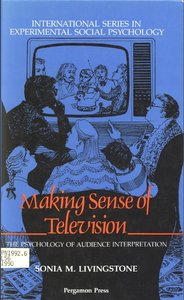Making Sense of TelevisionThe Psychology of Audience Interpretation
|

|
 Diese Seite wurde seit 11 Jahren inhaltlich nicht mehr aktualisiert.
Unter Umständen ist sie nicht mehr aktuell.
Diese Seite wurde seit 11 Jahren inhaltlich nicht mehr aktualisiert.
Unter Umständen ist sie nicht mehr aktuell.
 Zusammenfassungen
Zusammenfassungen
 New technological developments and increasing leisure time ensure that television will continue to structure and influence people's experiences and understanding of their social world far into the future. Making Sense of Television addresses an issue central to the social psychological perspective on the mass media - how viewers interpret the programmes that they see. How do people use their own everyday social knowledge and experience to guide their interpretations; how far do viewers agree with the text and with critics, researchers and each other in making sense of television, and finally, do different ways of interacting with programmes lead to different interpretations? These questions are addressed both theoretically and empirically. A critical review of relevant literatures in psychology, communications and literary criticism is followed by an analysis which seeks to integrate these research literatures to provide a new perspective on the audience's everyday interpretations of television. An integration of cognitive social psychology with reception theories from literary criticism is proposed as a way of analysing the processes of interpretation which mediate between television content and effects. Studies on viewers' interpretations of the characters and narratives of popular soap operas demonstrate the value of the proposed perspective.
New technological developments and increasing leisure time ensure that television will continue to structure and influence people's experiences and understanding of their social world far into the future. Making Sense of Television addresses an issue central to the social psychological perspective on the mass media - how viewers interpret the programmes that they see. How do people use their own everyday social knowledge and experience to guide their interpretations; how far do viewers agree with the text and with critics, researchers and each other in making sense of television, and finally, do different ways of interacting with programmes lead to different interpretations? These questions are addressed both theoretically and empirically. A critical review of relevant literatures in psychology, communications and literary criticism is followed by an analysis which seeks to integrate these research literatures to provide a new perspective on the audience's everyday interpretations of television. An integration of cognitive social psychology with reception theories from literary criticism is proposed as a way of analysing the processes of interpretation which mediate between television content and effects. Studies on viewers' interpretations of the characters and narratives of popular soap operas demonstrate the value of the proposed perspective. Dieses Buch erwähnt ...
Dieses Buch erwähnt ...
 Begriffe KB IB clear |  Fernsehen Fernsehen television television
|
 Volltext dieses Dokuments
Volltext dieses Dokuments
 Bibliographisches
Bibliographisches 
 Beat und dieses Buch
Beat und dieses Buch
Beat hat dieses Buch während seiner Zeit am Institut für Medien und Schule (IMS) ins Biblionetz aufgenommen. Beat besitzt kein physisches, aber ein digitales Exemplar. (das er aber aus Urheberrechtsgründen nicht einfach weitergeben darf). Aufgrund der wenigen Einträge im Biblionetz scheint er es nicht wirklich gelesen zu haben. Es gibt bisher auch nur wenige Objekte im Biblionetz, die dieses Werk zitieren.











 , 3704 kByte)
, 3704 kByte) 
 Biblionetz-History
Biblionetz-History